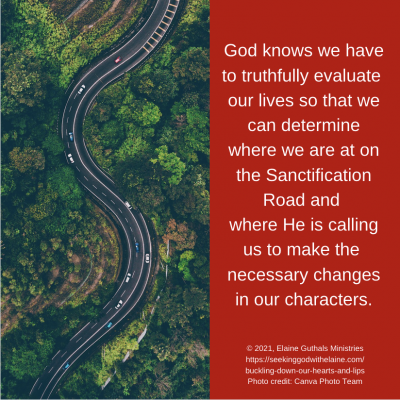Haven’t we had something pop out of our mouths at times? This daily devotional looks at how we should guard our hearts and tongues.
Nuggets
- Our hearts are the root, so we must guard them, also.
- There are many ways in which our lips can get us in trouble.
To read devotions in the Redo for Godliness series, click the appropriate button below.
Devotions in the How Do We Live Godly Lives? series

It is very easy for us to have things comes flying out of our mouths. God calls His disciples to do better.
We have to be on guard. This includes our hearts and our lips.
“Keep a constant watch over your hearts. David desires God to ‘set a watch before the door of his lips’ (Psalm 141:3): much more should we desire that God would keep the door of our hearts” (Charnock, The Sinfulness and Cure of Thoughts)
Let's Put It into Context #1
We’ve been looking at Charnock’s sermon entitled The Sinfulness and Cure of Thoughts to show us how to cleanse, a.k.a. sanctify, our thought processes. Charnock has taught us
- that we cleanse our thoughts when we return to having a strong relationship with God. We can do that by studying the Scriptures, meditating on God, contemplating on His creation, and praising Him.
- that we focus our thoughts by being humble instead of prideful, following God instead of the worldview, working instead of being idle, and laboring for Him.
- that we overcome our evil thoughts by burying ourselves in Scripture and relying on His omniscience and judgment.
Resource
Glossary
Here is a running list of what we’ve discussed previously.
Set a Guard over Our Hearts
“LORD, set up a guard for my mouth; keep watch at the door of my lips” (Ps. 141: 3 CSB)
Our hearts are the root, so we must guard them, also.
It kind of threw me a second that Charnock started with guarding our hearts when the verse he chose was all about guarding our lips. But then I think I figured out what he was getting at.
The Homilist helped. They wrote, “He prays against wrong in practice.”
Resource
Our character is really at our heart level. If that is wrong, the lips are probably going to shoot out something that is wrong.
We can’t practice in our hearts what is wrong. We can take that a couple of ways.
Wrong actions cannot be applied or done in a situation. We have to guard against choosing to do what God doesn’t want us to do.
But we also can’t make them our custom. They can’t become standard operating procedure.
Like the Homilist said, we need to stay away from worldly pursuits of what is wrong. One way we do that is by watching the company that we keep.
To read a related devotion, click the button below.
Set a Guard over Our Lips
“LORD, set up a guard for my mouth …” (Ps. 141: 3 CSB)
There are many ways in which our lips can get us in trouble.
Who out there has had the wrong words just shoot out of your mouth at some point or another? Like everyone.
The old saying “sticks and stones may break my bones, but words will never harm me” isn’t really true. Words can do a lot of damage.
How important is the tongue? James answered that question. “And the tongue is a fire, a world of unrighteousness. The tongue is set among our members, staining the whole body, setting on fire the entire course of life, and set on fire by hell” (Jas. 3: 6 ESV).
We can make a lot of mischief with our tongues. Gisborn gave us a long list.
- Foolish talking
- Impatience and discontent
- Contentious
- Pride and vanity
- Censoriousness
- Meddling
- Deceit
- Violations of modesty
- Profanity
Resource
Foolish talking
“Obscene and foolish talking or crude joking are not suitable, but rather giving thanks” (Eph. 5: 4 CSB)
Whoa! Gisborne didn’t hold anything back. He wrote, “Some persons are so indisposed to sobriety of thought, and have so long accustomed themselves to regard seriousness as bordering upon stupidity or gloom, that the gravest concerns lose in their conversation every symptom of importance. The wisest reflections are encountered with unmeaning laughter; and conclusions of the highest moment are repelled by a paltry effort at a jest.”
Resource
I know. Let’s break that down so we can make it more understandable.
Disciples are called to be sober. Sober is a character trait distinguished by self-control, genuineness, and sound moral judgment.
That would make “indisposed to sobriety of thought” to be someone who couldn’t control their thoughts or their tongue. They not only can’t control them, they hit the extremes.
One reason they are all over the board is they “… have so long accustomed themselves to regard seriousness as bordering upon stupidity or gloom ..,” They don’t want to be serious.
Now, if you have been reading my devotions for a while, you know I lead with humor. However, we have to temper that with seriousness. That doesn’t make us stupid or give us a gloom and doom attitude.
It means we are grounded in reality. God doesn’t want us to be the party animals or the class clown. He doesn’t want us to focus on the frivolous.
God’s doesn’t want us to discount what others say just because we think they are too deep. He doesn’t want us to write them off through humor.
God wants us to have a realistic viewpoint. He knows we have to truthfully evaluate our lives so that we can determine where we are at on the Sanctification Road and where He is calling us to make the necessary changes in our characters.

Impatience and Discontent
If we take the frivolousness up a step, we could become impatient and discontent with our lives. That is directly opposite of how calls us to be.
We talked about the benefits of waiting on God in The Silence of Waiting on God. We said that God wants us to wait silently on Him, not compare ourselves to worldview people who are considered successful.
To read a related devotion, click the button below.
But that doesn’t mean we aren’t doing anything. We are trusting God. Resting and waiting are actions because they are conscious decisions.
Instead of waiting on God, though, we sometimes rail on God. Oh, yeah. When God isn’t working on our timetable, out of our lips and minds come all sorts of words cutting Him down.
We blow right through God’s call to be content with our lives. Contentment is being satisfied regardless of the circumstances of our lives.
Devotions in the Contentment Leads to Tranquility series
God wants us to wait on His provision. He will give us what is best for us.
Contentious
This kind of goes along with being content. I see this as the next step.
We aren’t content with our lives, and we let everyone know about it.
But it doesn’t stop there. Gisborne wrote, “If anger in its lowest degree overtake you, beware of transgression. Sin after sin is the usual consequence of anger; and among the first sins which arise from anger are sins of the tongue.”
Gisborne also connected this with our hearts, He wrote, “The irritated mind unburdens itself in passionate language. When the heart glows with resentment, heat and vehemence of language betray the inward flame.”
Resource
Oh, yeah. Discontentment breed contentiousness. We let ’er rip when we resent and envy that we are not where we want to be.
All the hatred comes spewing out.
Pride
The flip side is when we are content. Instead of it coming out as satisfaction and tranquility, it comes out as pride. Pride is a unrealistic high opinion of oneself that is based on faulty self-esteem.
We don’t get that it is not a true picture. Maybe, we so want it to be true that we lie to ourselves.
God doesn’t want us lying to ourselves or to anyone else. “The LORD detests lying lips, but he delights in people who are trustworthy” (Prov. 12: 22 NIV).
I just said it. God wants us to make a fair and true assessment of ourselves. If we don’t, we may not get all of the sin cut out of our lives.
Censoriousness
What is bad is when our own pride affects how we view others. Censoriousness means being critical of others. Our pride is often built on tearing others down.
Gisborne described it this way. He wrote “Solicitous in every circumstance of life to magnify himself, he speaks contemptuously and degradingly of others; and the more contemptuously and degradingly in proportion as he apprehends that they may be advantageously compared with him, or may stand in the way of his enterprises and projects.”
Resource
I don’t know if that is better or worse than when we are censorious without realizing it. We know we can be careless in our conduct with others. It may be a byproduct of selfishness, or it may just be our self-centeredness.
When we do act purposefully, we can be censorious through anger, spite, or envy. That is totally opposite as to how God wants us to interact with others.
The second greatest commandment is that we are to love others. “The second is, Love your neighbor as yourself …” (Mk. 12: 31 CSB).
Glossary

Meddling
“Let none of you suffer as a murderer, a thief, an evildoer, or a meddler” (I Pet. 4: 15 CSB)
At times, we really do have unconscious unguarded tongues. We end up sticking our noses into other people’s lives.
We may tell ourselves we are trying to help them. But we don’t.
- “A gossip betrays a confidence, but a trustworthy person keeps a secret” (Prov. 11: 13 NIV).
- “Whoever conceals an offense promotes love, but whoever gossips about it separates friends” (Prov. 17: 9 CSB).
- “Without wood, fire goes out; without a gossip, conflict dies down” (Prov. 26: 20 CSB).
- “Make it your goal to live a quiet life, minding your own business and working with your hands, just as we instructed you before” (I Thess. 4: 11 NLT).
Meddling is a significant sin. It could really wreck our witness.
Deceit
“Do not go about spreading slander among your people; do not jeopardize your neighbor’s life; I am the LORD” (Lev. 19: 16 CSB)
Gisborne perfectly described what happens when we lie. He wrote, “The liar destroys the foundation of all confidence, whether in the public dealings of men one with another, or in the retirement of domestic life.”
A step up from that is slander. He called it a more refined way to lie.
Gisborne saw it this way, contending that slander fuels much sin. That sin will be punished on judgment day. “But the cowards, faithless, detestable, murderers, sexually immoral, sorcerers, idolaters, and all liars —their share will be in the lake that burns with fire and sulfur, which is the second death” (Rev. 21: 8 CSB).
Violations of modesty
“But now is the time to get rid of anger, rage, malicious behavior, slander, and dirty language” (Col. 3: 8 NLT)
But God wants us to cut all of that out of our lives. Gisborne wrote, “There is no sin which is more odious in its nature, more expressive of a depraved and polluted heart.”
Resource
God doesn’t want us to have even the stain of sin. He wants us to be pure.
Profanity
Gisborne told us exactly what was included in the term profanity. He wrote, “This sin comprehends every irreverent expression concerning the Deity, His titles, His attributes, His providence, His revelation, His judgments.”
Resource
Profanity focuses on our being irreverent to God.

Making the Connections
I can see where the heart is tied to the lips here. The heart is the core of us. It is tied to our character.
The lips are our expression of that character. What we say doesn’t make us who we are. It shows others who we are.
How Do We Apply This?
We need to keep Hawk Nelson’s song in mind. Words can go either way. They can build someone up or tear someone down. We want to build them up.
Related Links
Hawk Nelson
Father God. We want our hearts after Your own heart and our character to be imitating You. Help us to guard them for Your service. Amen.
What do you think?
Leave me a comment below (about this or anything else) or head over to my Facebook group for some interactive discussion.
If you don’t understand something and would like further clarification, please contact me.
If you have not signed up for the email daily or weekly providing the link to the devotions and the newsletter, do so below.
If God has used this devotion to speak with you, consider sharing it on social media.